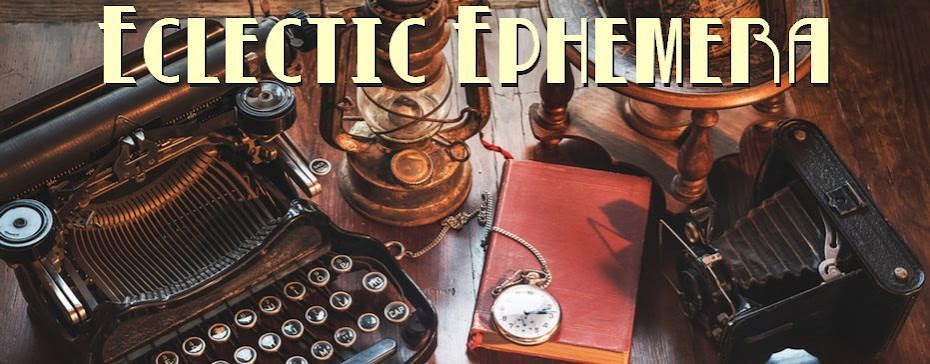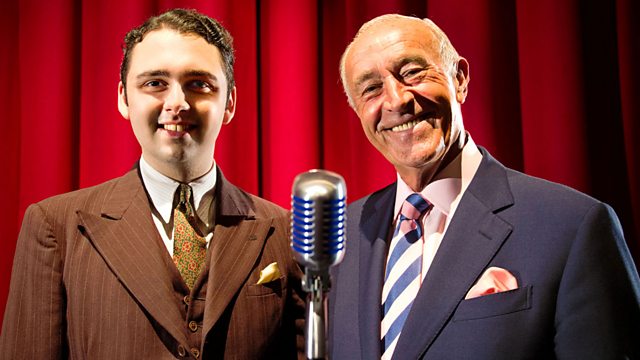 |
| Period sleuthing (and bow ties) are the order of the day! |
Since we are all trying to find other things to keep us entertained at the moment, and with the television here in the UK not really stepping up to the crease inasmuch as offering much in the way of escapism (or even erudition), I thought now would be a good time to do a post on another form of media that has been keeping me sane for a while - podcasts. Specifically, podcasts featuring popular music from our favourite era - the 1920s and 1930s!
 Vintage music podcasts are something I've been supplementing my own record collection with for some time now and by and large I've found them to be a jolly little fillip to my enjoyment of '20s and '30s jazz. As well as providing an introduction to hitherto unheard-of bands and their music (rather like the equivalent of hearing a new pop group's song on the radio) it's just nice sometimes to hear a friendly voice sharing their enthusiasm for an otherwise sadly overlooked genre and reminding you that you're not the only one out there who likes listening to it! So without further ado I present you with my current list of podcasts and internet radio stations that showcase those toe-tapping tunes from the Jazz Age. Some of them are fairly recent discoveries, others I've been listening to for years, but all are great things to have on in the background while you're busying about the house.
Vintage music podcasts are something I've been supplementing my own record collection with for some time now and by and large I've found them to be a jolly little fillip to my enjoyment of '20s and '30s jazz. As well as providing an introduction to hitherto unheard-of bands and their music (rather like the equivalent of hearing a new pop group's song on the radio) it's just nice sometimes to hear a friendly voice sharing their enthusiasm for an otherwise sadly overlooked genre and reminding you that you're not the only one out there who likes listening to it! So without further ado I present you with my current list of podcasts and internet radio stations that showcase those toe-tapping tunes from the Jazz Age. Some of them are fairly recent discoveries, others I've been listening to for years, but all are great things to have on in the background while you're busying about the house. 78Man Presents
One of my more recent discoveries, 78Man Presents plays a varied selection of music taken - as the name suggests - from his own collection of 78rpm records dating from the 1900s right through to the 1950s. Featuring mainly British dance bands, as is to be expected from a British production; although the focus is sometimes too much on novelty songs for my liking it still features a good selection of tunes from across the first fifty years of the 20th century.
Angel Radio
A slightly different format this one, Angel FM is a community radio station based in Havant, Hampshire, broadcasting to the local area on FM & DAB radio but also available worldwide via its website. I featured it in a post back in 2011 when it was still only a "pop-up" station and it is wonderful to see how it has evolved since then, its aims eminently laudable and well worth supporting. Although it claims to focus on providing music for the older generation, we know that this means music that we "old souls" can enjoy as well (nothing from after 1959 - sounds good!) and lo and behold there are a number of shows on throughout the week that play popular standards from the Forties back.
The British Dance Band Show
Not available as a podcast per se; you can only listen to or download individual mp3 files from the website from what I can gather. John wright is another British dance band aficionado with an extensive 78rpm record collection that again forms the backbone of these broadcasts, which are nevertheless as enjoyable and informative as any other.
Phonotone Classic
Another internet radio station this one, devoted to dance band music from 1925 to 1945 according to its "About" page. As befits a world wide web wireless it's not just British dance bands either but artists from the USA and even Germany among others. It's also splendid to see the younger generation involved in this enterprise; Jonathan Holmes, presenter of the "British Dance Band Programme", is a particularly welcome ambassador for the genre among young people, coming across as relaxed, well-informed and enthusiastic about his subject. He also has a decent YouTube channel, which I can heartily recommend as well (in fact a separate post for similar channels may well be forthcoming in the future!).
Radio Dismuke
This is yet another internet radio site that I believe you can only listen to online, but one that has been on my radar - and that of some of my followers I think - for some time now. Being Texas-based it focuses largely on dance and swing bands from the United States, however bands from Britain and Germany are also well-represented. While it is generally non-stop music there are also occasional live "Special Broadcasts" from the owner of a local record store, who presents his programme every month or so.
Shellac Stack
This is the vintage music podcast that started it all for me and the one I have been listening to and enjoying the longest. Presented by Bryan S. Wright, who is an accomplished jazz pianist and music historian, and based in Pittsburgh, Pennsylvania (my aunt's home town - hello Pittsburgh; go Steelers!) these hour-long broadcasts feature a nicely-judged mix of tunes from the 1910s-1950s . While again naturally leaning towards American groups there's a good smattering of British and other bands and just the right number of novelty songs, all introduced by Bryan with friendly, easy-going style and obvious passion and knowledge. It's great to hear the enthusiasm for these songs from a younger person again as well and I tip my hat to Mr Wright for helping to keep the torch alight. Able to be listened to on site or downloaded as an mp3, Shellac Stack is also available on iTunes (although I note there hasn't been a new episode since September, so I hope all is well with him - still definitely worth a listen, anyway!).
That Gramophone Show
A further new find and one that is fast becoming a favourite (albeit again it hasn't been updated since November, so we can only hope that it is not short-lived!). Presenter Neil Starr again delves into his personal collection of 78rpm records and, although being a British production, bands from both sides of the Atlantic are featured in good balance. It's nice to hear some informative speech in between records as well and the mix is precisely right to make the hour pass enjoyably and just briskly enough. This podcast is also available on iTunes (as well as other podcast programs).
That, then, is one type of [vintage] media that has been keeping me entertained these last few weeks (and beyond) and it is my hope that you find something among them all to divert you if only for a time. Enjoy the music and let me know in the comments what you've been up to - and if there are any stations or podcasts I've missed from this list!






